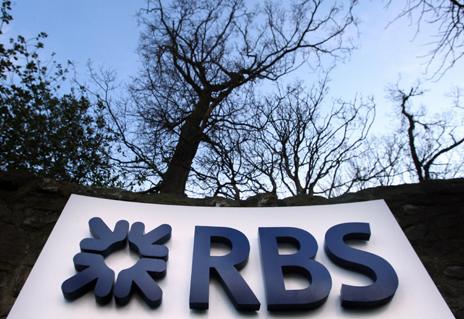Was RBS brutal, overwhelmed or both?
- Published
- comments

Lawrence Tomlinson has written a horror story of viable businesses forced into insolvency and lives ruined by bankers who were insensitive at best and rapacious at worst.
And perhaps the most important thing this "entrepreneur in residence" at the Business, Innovation and Skills Department has done is to give a voice to folk whose failing businesses are too big to be allowed to make a complaint to the ombudsman, and who lack the resources to sue.
Of course Royal Bank of Scotland is the bank that is pilloried most by him. It was, and is by far, the biggest banker to to small and medium size businesses. And it went absolutely bonkers - along with HBOS - in the years before the crash in lending to property or property-related business.
RBS and HBOS pretty much were the boom in commercial property before the crunch. If you include construction lending, around 80% of all RBS's lending in the five years to 2008 had a property element.
Inevitably, given the collapse in property values that began in 2007, thousands and thousands of its customers got into difficulties. The many billions of pounds of losses incurred by RBS, that almost sunk it, are testament to the mind-boggling number of staggeringly reckless corporate loans it advanced before the deluge.
It is not altogether surprising, given the scale of the mess RBS created if - in the process of trying to clean itself up - RBS succeeded in doing over and doing in some business that did not deserve it.
That's tragic for the innocent victims. And doubtless RBS deserves whatever punishment regulators now decide - at the urging of Tomlinson and business secretary Vince Cable - to dispense, long after the fact (and as it happens, RBS has appointed Clifford Chance to conduct its own review, so that it is forearmed for whatever chastisement awaits).
But it should be pointed out that there is some tension between what Vince Cable wants, which is more sensitive treatment of businesses hurt by recession, and what the Bank of England has been urging it to do.
You will probably remember that the bank, under the previous governor Lord King, has been exercised by how banks' ability to support potentially exciting new businesses has been hampered by the extent to which their capital has been locked up supporting hopeless cases, the notorious zombie businesses.
Regulators were particularly concerned that RBS had too many businesses on life support that would never recover - and that therefore the best thing to do would be put them out of their misery.
I am told, in fact, that there was considerable tension between regulators and RBS's recently departed chief executive, Stephen Hester, on whether RBS was moving fast enough to exterminate the putative zombies.
Now there is definitely a fairer and more transparent way to put a business into insolvency. And RBS may well be guilty of clumsiness and on occasion of pragmatic and self-interested seizure of temporarily under-valued assets to which it was not entitled.
But to state the bloomin' obvious, there is no nice way of closing down a company that for years was created, loved and nurtured by someone for whom it was a way of life.
And drawing the distinction between a business temporarily hurt by a downturn in the economy and one that is fundamentally uncompetitive can never be completely scientific and infallible.
As Tomlinson says, what this whole sorry saga may have highlighted (again) is how poisonous it is for British business and the British economy that there is so little choice when it comes to the provision of banking services and credit for smaller companies.
Together, RBS and Lloyds still have around half the market. Which means that as and when their customers feel that their respective bankers aren't treating them fairly or properly, they can't do the rational thing of shopping around for a better service elsewhere.
Lack of competition in banking may be the real poison here.